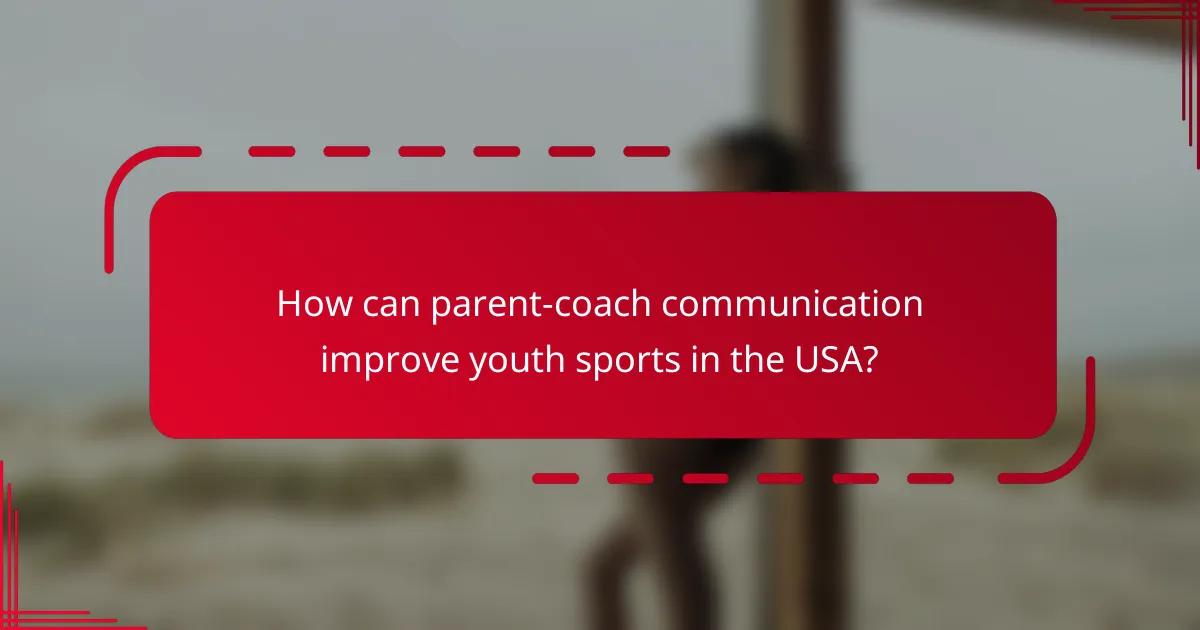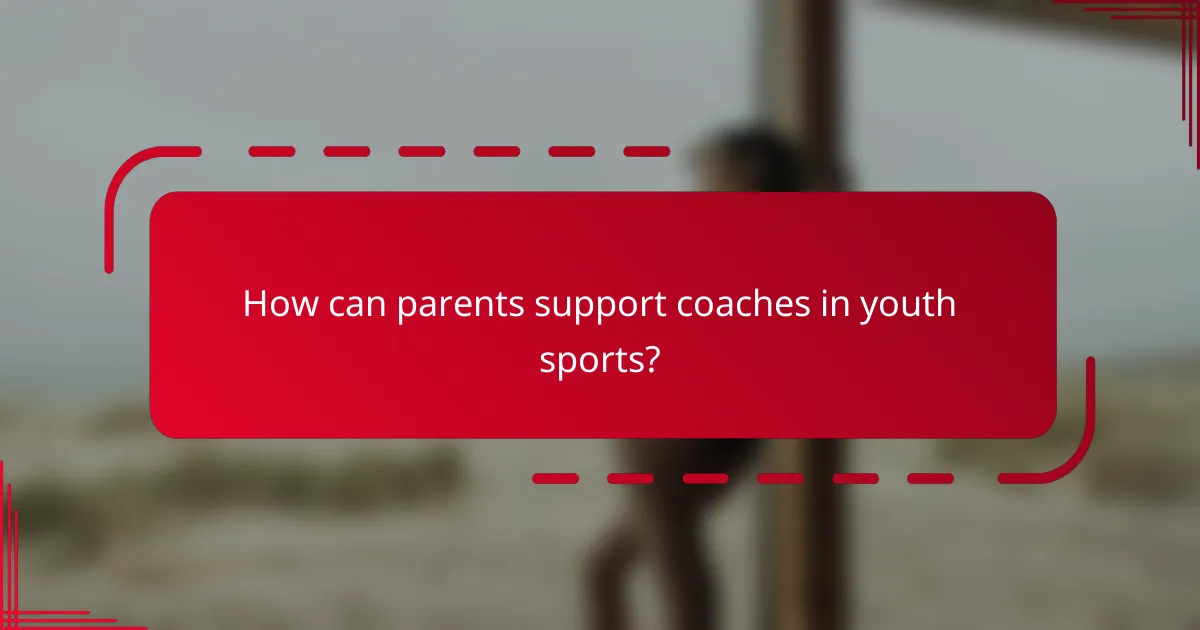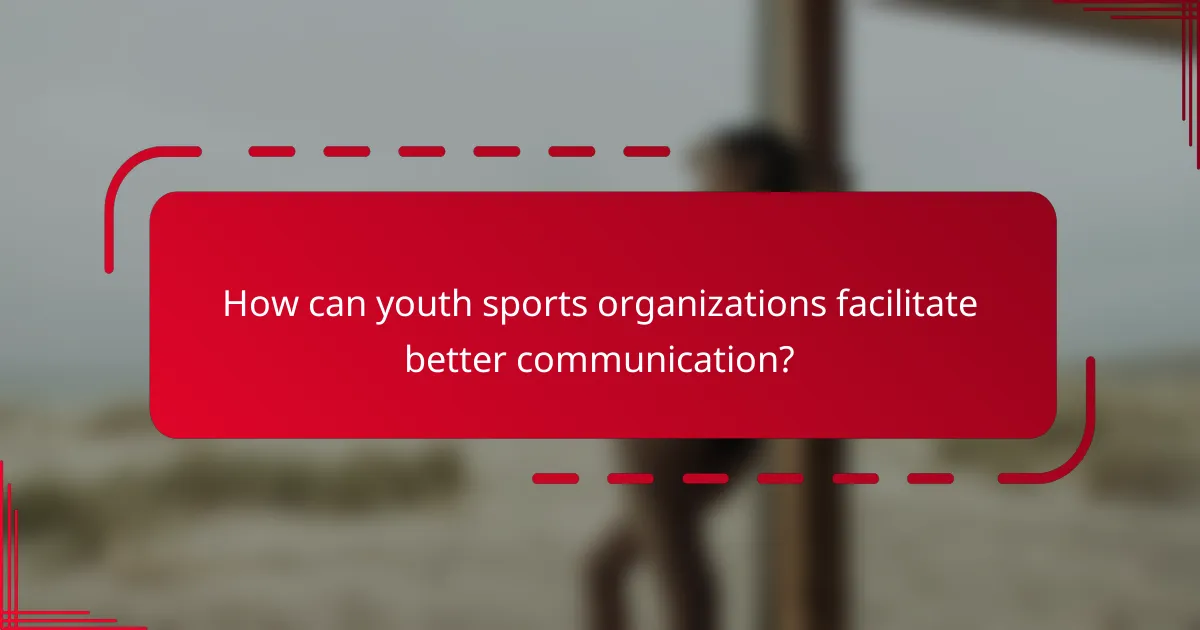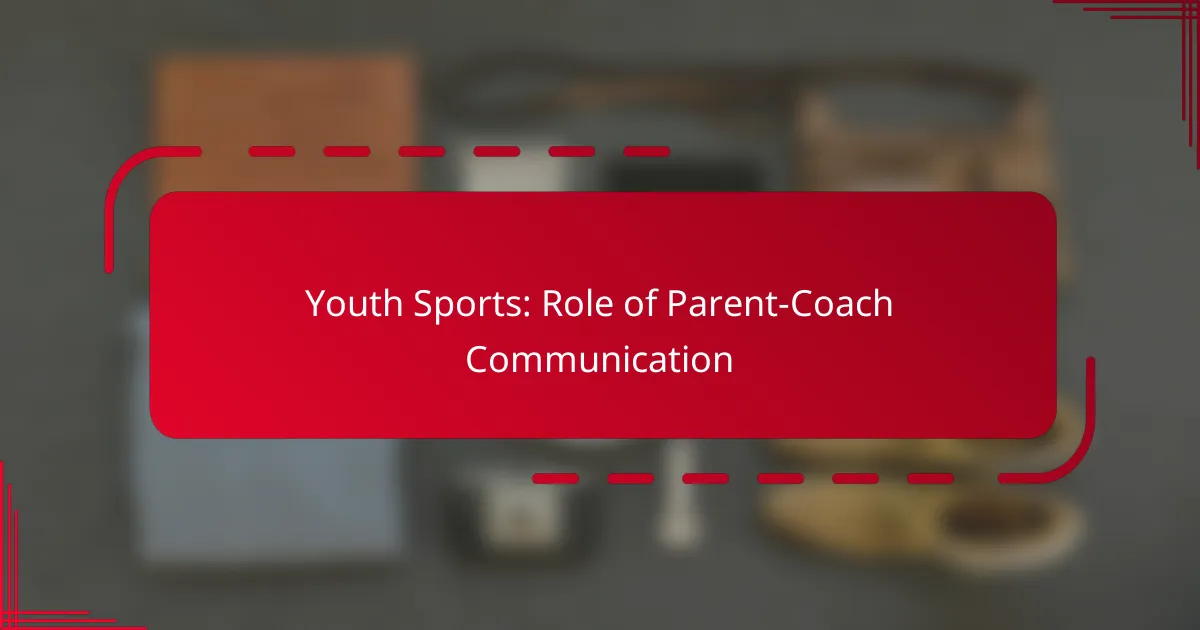Effective parent-coach communication is crucial in youth sports, as it creates a supportive atmosphere that benefits young athletes. By fostering clear dialogue, expectations can be aligned, athlete development can be encouraged, and a stronger community can be built around the team.

How can parent-coach communication improve youth sports in the USA?
Effective parent-coach communication can significantly enhance youth sports by fostering a supportive environment for athletes. Clear dialogue helps align expectations, encourages athlete development, and builds a stronger community around the team.
Enhanced athlete performance
When parents and coaches communicate openly, athletes receive consistent messages about their goals and performance. This alignment can lead to improved focus and motivation, as athletes understand what is expected of them both on and off the field.
Coaches can provide parents with specific feedback on their child’s progress, allowing them to reinforce positive behaviors at home. This partnership can help athletes develop skills more effectively, leading to better overall performance during games and practices.
Stronger team cohesion
Regular communication between parents and coaches promotes a sense of unity within the team. When parents are informed about team strategies and values, they can better support their children and the team’s objectives, fostering a collaborative atmosphere.
Additionally, when parents and coaches work together, they can address any conflicts or concerns promptly, preventing misunderstandings that could disrupt team dynamics. This proactive approach encourages athletes to feel more connected to their teammates and invested in the team’s success.
Increased parental satisfaction
Effective communication can lead to higher levels of parental satisfaction, as parents feel more involved and informed about their child’s sports experience. When parents understand the coaching philosophy and team goals, they are more likely to support decisions made by the coach.
Coaches should consider holding regular meetings or sending updates to keep parents engaged. This transparency can help alleviate concerns and build trust, leading to a more positive experience for everyone involved in youth sports.

What are effective communication strategies for parents and coaches?
Effective communication strategies for parents and coaches include regular feedback sessions, an open-door policy for concerns, and utilizing communication apps. These approaches foster a collaborative environment that supports youth athletes’ development and addresses any issues promptly.
Regular feedback sessions
Regular feedback sessions between parents and coaches are essential for maintaining clear communication. These meetings can be scheduled weekly or bi-weekly, allowing both parties to discuss the athlete’s progress, strengths, and areas for improvement.
During these sessions, it is beneficial to set specific goals for the athlete and review them periodically. This structured approach helps ensure that everyone is aligned on expectations and can adjust strategies as needed.
Open-door policy for concerns
An open-door policy encourages parents to voice any concerns they may have regarding their child’s experience in sports. This approach fosters trust and ensures that parents feel comfortable discussing issues without fear of repercussions.
Coaches should make themselves available for informal conversations before or after practices and games. This accessibility can lead to quicker resolutions of problems and a more positive atmosphere for both athletes and families.
Use of communication apps like TeamSnap
Communication apps like TeamSnap streamline interactions between parents and coaches by providing a centralized platform for updates, schedules, and announcements. These tools can help reduce misunderstandings and ensure that everyone stays informed.
Using such apps allows coaches to share important information instantly, such as changes in practice times or game locations. Parents can also use these platforms to communicate directly with coaches, making it easier to discuss their child’s needs and concerns.

What challenges do parents and coaches face in communication?
Parents and coaches often encounter several challenges that hinder effective communication. These obstacles can lead to misunderstandings and frustration, impacting the youth sports experience for both parties.
Time constraints
Both parents and coaches frequently juggle busy schedules, making it difficult to find time for meaningful conversations. Practices and games often leave little room for discussions, leading to rushed or incomplete exchanges.
To mitigate this, setting regular check-ins, such as weekly meetings or brief chats after practices, can help ensure that both parties stay aligned. Utilizing technology, like group messaging apps, can also facilitate quick updates and communication without requiring extensive time commitments.
Misunderstandings about roles
Confusion about the roles of parents and coaches can create tension. Parents may have different expectations regarding their involvement in coaching decisions, while coaches might assume parents understand their strategies and objectives.
Clarifying roles at the start of the season can help. Coaches should communicate their coaching philosophy and expectations for parental support, while parents should express their desires for involvement and feedback. This mutual understanding can prevent conflicts and enhance collaboration.
Different expectations
Parents and coaches often have varying expectations regarding performance, commitment, and communication styles. For instance, parents may prioritize winning, while coaches focus on skill development and teamwork.
To address these differences, open discussions about goals and values at the beginning of the season are crucial. Setting shared objectives can create a unified approach, ensuring that everyone is working towards the same outcomes for the athletes.

How can parents support coaches in youth sports?
Parents can support coaches in youth sports by actively engaging in team activities, offering constructive feedback, and participating in coaching clinics. This collaboration fosters a positive environment that benefits both players and coaches.
Volunteering for team activities
Volunteering for team activities is a practical way for parents to support coaches. This can include helping with practices, organizing events, or managing logistics during games. By taking on these roles, parents alleviate some of the workload from coaches, allowing them to focus more on player development.
Parents can also assist in fundraising efforts or coordinating transportation for away games. Such involvement not only strengthens the team community but also demonstrates to players the importance of teamwork and commitment.
Providing constructive feedback
Providing constructive feedback is essential for enhancing the coaching process. Parents should communicate openly with coaches about their observations and suggestions, focusing on specific behaviors rather than general criticisms. This approach helps coaches understand what is working well and what might need adjustment.
It’s beneficial for parents to frame feedback positively, highlighting strengths while addressing areas for improvement. Regular check-ins can facilitate a supportive dialogue that ultimately benefits the players’ experience.
Attending coaching clinics
Attending coaching clinics allows parents to gain insights into coaching techniques and philosophies. These clinics often cover topics such as effective communication, player motivation, and skill development strategies. By understanding these concepts, parents can better support coaches and align their expectations with coaching goals.
Participation in such clinics also demonstrates a commitment to the team and can foster a collaborative atmosphere between parents and coaches. Parents should seek out local clinics or online resources to enhance their knowledge and engagement in youth sports.

What role does technology play in parent-coach communication?
Technology significantly enhances parent-coach communication by providing efficient channels for updates, scheduling, and performance feedback. Tools such as social media, online scheduling platforms, and video analysis software facilitate timely interactions and improve engagement between parents and coaches.
Use of social media for updates
Social media platforms like Facebook, Twitter, and Instagram serve as effective tools for coaches to share updates with parents. Coaches can post practice schedules, game results, and important announcements, ensuring that parents stay informed in real time.
To maximize the benefits, coaches should create private groups or pages where only team members and parents can access information. This fosters a sense of community and encourages parents to engage with one another and the coaching staff.
Online scheduling tools
Online scheduling tools, such as TeamSnap or Google Calendar, help streamline the process of organizing practices and games. These platforms allow coaches to send invites, track attendance, and manage changes easily, reducing confusion about schedules.
Parents can receive notifications about upcoming events and any last-minute changes, ensuring they are always aware of their child’s commitments. It’s essential for coaches to choose a user-friendly platform that parents can access without technical difficulties.
Video analysis for performance feedback
Video analysis tools enable coaches to provide detailed performance feedback to athletes and their parents. By recording practices or games, coaches can highlight strengths and areas for improvement, facilitating constructive discussions.
Parents can view these videos to better understand their child’s development and the coaching process. Coaches should ensure that video sharing respects privacy and consent, particularly for minors, by using secure platforms that limit access to authorized viewers only.

How can youth sports organizations facilitate better communication?
Youth sports organizations can enhance communication by implementing structured channels and regular updates between coaches and parents. This ensures that everyone is informed about schedules, expectations, and any changes that may arise throughout the season.
Establish clear communication channels
Setting up designated communication channels, such as team emails, messaging apps, or dedicated websites, can streamline information sharing. These platforms should allow for easy access to schedules, practice updates, and important announcements.
For example, using a group messaging app can help coaches quickly inform parents about last-minute changes, such as weather-related cancellations. This immediacy can prevent confusion and ensure that everyone stays on the same page.
Regular meetings and updates
Holding regular meetings or sending out updates can foster a culture of transparency and trust. Organizations should schedule pre-season meetings to outline expectations, discuss goals, and address any concerns from parents.
Additionally, periodic updates throughout the season can keep parents informed about their child’s progress and any team developments. This could be in the form of newsletters or brief online check-ins.
Encourage feedback from parents
Creating an environment where parents feel comfortable providing feedback is essential for effective communication. Organizations should actively solicit input on coaching methods, scheduling, and overall team dynamics.
Surveys or informal discussions can be useful tools for gathering parent opinions. This feedback can help coaches adjust their strategies and improve the overall experience for both players and families.
Provide resources and training
Offering resources and training for both coaches and parents can enhance communication skills. Workshops on effective communication techniques can help coaches convey their messages clearly and help parents understand their roles in supporting their children.
Additionally, providing resources on youth sports development can equip parents with knowledge about what to expect, thereby reducing misunderstandings and fostering a supportive environment for young athletes.
